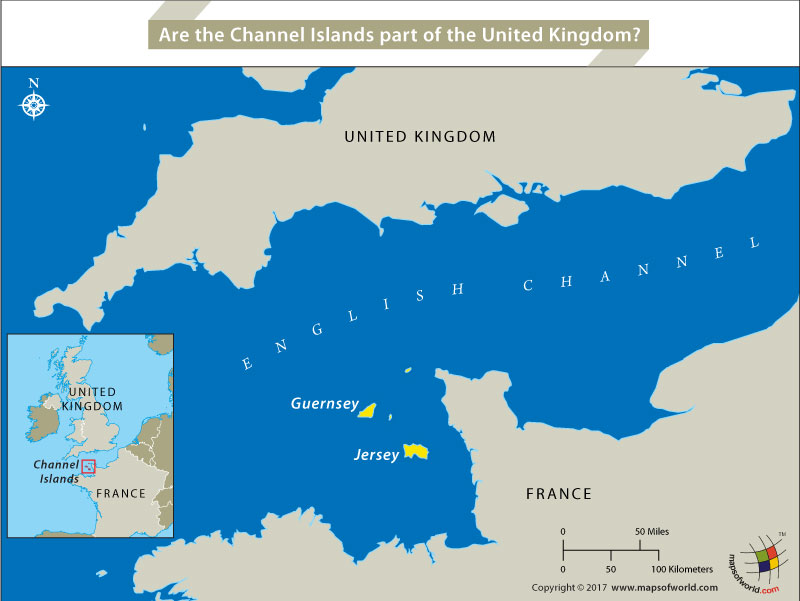

Map highlighting location of Channel Islands between UK and France
The Channel Islands make up an archipelago located in the English Channel, just off the Normandy coast. Despite the location of these islands to the west of the Cotentin peninsula (France), they are dependencies of the British crown. These islands, named the Channel Islands by the Royal Navy, share a very complex relationship with the United Kingdom. They are not part of the UK per se, but form two Crown dependencies – the Bailiwick of Jersey (Jersey Island, Ecrehous rocks, and Les Minquiers) and the Bailiwick of Guernsey (Alderney, Sark, Herm, Jethou, Lihou, and Brecqhou). Since the 13th century, the two bailiwicks have maintained their own independent administration. This means that their legislative process, executive, and judiciary are independent of the UK. These dependencies are not sovereign nations, though. This means that they are not constitutionally independent. This also means that defense and international relations of these dependencies are managed by the UK, and they are neither a member of the Commonwealth of Nations nor of the European Union.
This complex relationship between the Channel Islands and the United Kingdom finds its roots in the mid-11th century, when William the Conqueror invaded England. At this time, the Channel Islands were part of the Duchy of Normandy. With the 1259 Treaty of Paris, when England ceded its claim on Normandy, the Channel Islands remained the only exception. Despite choosing to remain under the Crown of England at the time, the islands chose to retain the Norman customary law. The Channel Islands were at the center of a long-standing dispute between England and France, which was finally resolved by the International Court of Justice, which ruled in favor of the British in 1953.
Certain aspects of this complex relationship between the United Kingdom and the Channel Islands merit a closer look. The residents of the Channel Islands are not British citizens, but are considered British subjects. They hold British passports but are not endowed with the same rights (of free travel and work in the EU) enjoyed by any British citizen.
The Channel Islands are still part of the sterling pound union, and retain use of the GBP 1 note. They have their own currency variants which are also accepted as legal tender in the UK. Despite having their own judicial system, cases can still be referred to judicial committees in the UK for ultimate resolution.
While they are not members of the European Union, the two bailiwicks maintain a joint office in Brussels and are part of the European customs territory. They also have been granted a special status which allows them to negotiate tax disclosure and co-operation understandings with other OECD countries.
Ultimately, while the Channel Islands are not part of the UK, the relationship between the two is a historically and culturally close one.
Related Maps:
The Republic of Madagascar is an island country located in the Indian Ocean, off the…
The Euro is the official currency of the European Union. It is, however, not incumbent…
There are many countries or regions that are partially recognized by the UN, have disputes…
The Alaska Statehood Act was signed into law by President Dwight D. Eisenhower in 1958,…
The name Persia may, however, only be used to refer to Iran in some contexts.…
Hawaii is an Island State in the US. It is one of the 50 states…